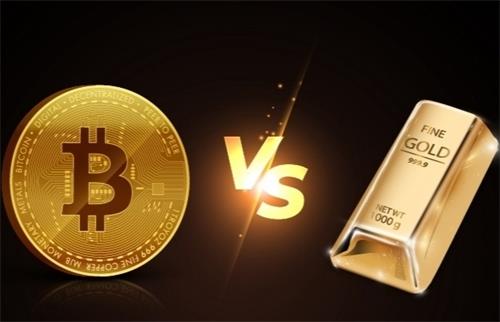Which Holds Value Better: Bitcoin or Gold?
It is widely known that many investors regard Bitcoin as a new form of gold, even calling it "digital gold." However, research comparing the price fluctuations of both assets has shown that their correlation is nearly zero. The reason why Bitcoin and gold are frequently compared is due to their similarities—both have a limited supply that cannot be controlled by government policies, and both are viewed as hedges against inflation and stores of value. For investors, a key question remains: which of the two preserves value better?
Gold vs. Bitcoin: Similar or Fundamentally Different?
While Bitcoin and gold share similarities, such as limited supply and being potential alternatives to fiat currency, directly comparing them is an oversimplification. When considering market structure, investment performance, and their roles in a portfolio, significant differences emerge. In fact, their functions within the financial ecosystem are not interchangeable.
Gold’s Dual Nature:
Gold has long been recognized as both a currency and a commodity, a dual characteristic that gives it a unique position in the global financial system. As a precious metal, gold is not only used for trading but also widely applied in jewelry, technology, and industry. In finance, gold serves as a key reserve asset for governments, corporations, and individual investors.
During economic downturns, gold typically performs well, providing a safe-haven asset for investors. Conversely, during economic expansion, gold benefits from growth, offering stable returns. This dual nature allows gold to play a strategic role in investment portfolios, offering both returns and effective risk diversification.
Bitcoin’s Singular Nature:
Unlike gold, Bitcoin and other cryptocurrencies exist primarily as digital assets, setting them apart fundamentally. Bitcoin, as a digital currency, operates through blockchain technology. While its supply is capped, its demand is largely driven by investment and speculation rather than practical applications as a commodity.
Bitcoin’s value is highly dependent on market sentiment and speculative demand, leading to extreme price volatility. Although Bitcoin has experienced significant price growth in recent years, its price movements are driven by speculative capital, in stark contrast to gold’s role as a stable hedge and store of value.
Supply Characteristics of Gold and Bitcoin:
Both gold and Bitcoin share the characteristic of limited supply, but their scarcity and distribution differ.
Gold, as a natural resource, has had a historically stable supply constrained by mining capabilities. As extraction becomes more difficult over time, gold’s supply remains relatively stable.
Furthermore, despite technological progress, gold’s rarity remains largely unchanged, solidifying its role as a widely recognized store of value.
In contrast, Bitcoin has a built-in supply limit of 21 million coins.However, the current mining rate remains high, with an annual increase of nearly 3%. While Bitcoin’s issuance will gradually slow, reaching its limit around 2140, emerging technologies could introduce more efficient cryptocurrencies, potentially challenging Bitcoin’s dominance and supply constraints.
Differences in Ownership Distribution:
The ownership structure of gold and Bitcoin also varies significantly. Gold is globally recognized and widely distributed among individual investors, central banks, jewelers, and industrial sectors. This broad ownership base contributes to its liquidity and relatively low risk.
In contrast, Bitcoin’s ownership is highly concentrated. Data indicates that 2% of Bitcoin holders possess 95% of the entire supply.Additionally, Bitcoin mining operations are concentrated in a few countries and institutions, making the market more vulnerable. If mining power and ownership become further centralized, it could pose risks to Bitcoin’s network security and market stability.
Conclusion
Although Bitcoin and gold share certain characteristics, they differ fundamentally. Gold’s dual nature as both a currency and a commodity solidifies its role as a strategic investment, offering stable returns and risk diversification. Bitcoin, in contrast, functions primarily as a digital asset whose value is heavily influenced by speculation, leading to high volatility. Unlike gold, Bitcoin lacks inherent commodity utility and widespread practical application.While both assets have a place in modern investment portfolios, they serve distinct purposes. Gold remains a stable, long-term investment, whereas Bitcoin appeals to those willing to take higher risks for potential short-term gains. Though they can coexist, neither can fully replace the other in terms of value preservation.







